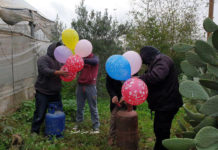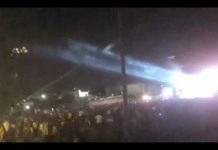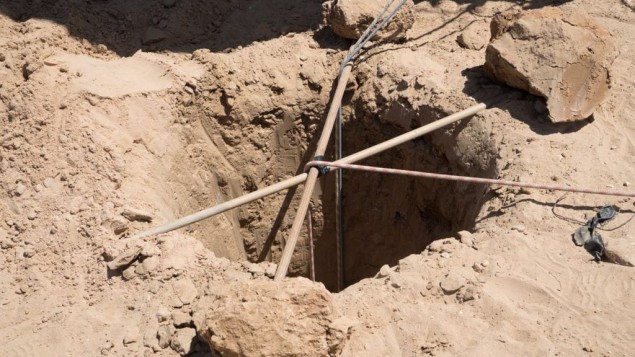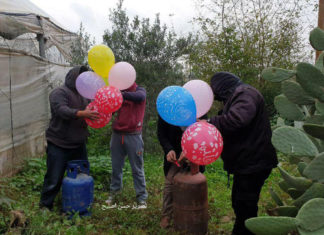Officials say Hamas does not seek escalation, is not behind rocket fire on communities; farmers to be allowed back to fields near border.
In photo: Entrance to a Hamas terror tunnel discovered by the IDF running under the Gaza border into Israel on May 5, 2016. (IDF Spokesperson’s Unit)
Israeli officials said Saturday they would continue operations to uncover and destroy crossborder attack tunnels in the Gaza Strip over the coming weeks, even as Israel and Hamas sought to calm tensions along the frontier. But officials told Channel 10 news that Hamas’s tunnel infrastructure was far from the robust network the group possessed before the 2014 Gaza war, and included a small number of tunnels only.
Despite the ongoing efforts to destroy the underground threat, Israeli officials stressed that they did not believe there was a substantial danger of renewed conflict on the Gaza border. While Hamas has intermittently exchanged fire with Israeli troops as they worked to destroy tunnels inside Gaza territory, especially in the past week, the group has conveyed to Israel through Egypt that it does not seek escalation. Security officials noted that two rockets fired from the Palestinian enclave early Saturday morning were not thought to have been launched by Hamas, but by a smaller terror group seeking to destabilize the region. Hamas, they said, was not seeking to widen the conflict to attacks on civilians, and was limiting its fire to troops operating inside Gaza.
Channel 10 reported that Israeli farmers who had been barred from fields within a kilometer from the Strip, for fear of Gazan sniper fire, would be allowed to return on Sunday. And as residents of Israeli communities near the border demanded increased security and army presence on their perimeters, the army has insisted that regular troop deployment along the border is enough to guarantee civilians’ safety.
On Friday Hamas Gaza leader Ismail Haniyeh said his group was not seeking war with Israel but would not tolerate Israeli troops entering the Palestinian territory. “We are not calling for a new war, but we will not under any circumstance accept these incursions,” he said in a prayer sermon in the Gaza Strip. Haniyeh said that Israeli forces had intruded “150 to 199 meters (165 to 220 yards) on the pretext of searching for tunnels.” We sent multiple messages that the resistance will not allow the Israeli occupation army to impose new rules within the borders of the Gaza Strip,” Haniyeh said.
Israeli fighter jets struck Hamas targets in the southern Gaza Strip early Saturday, following the rocket attack. It was Israel’s fifth series of airstrikes since Wednesday, when tensions spiraled over IDF efforts to locate attack tunnels dug by Hamas from Gaza into Israeli territory. One of the two rockets fired from Gaza landed in an open area of the Eshkol regional council overnight FridaySaturday. The second fell close to the border fence, Army Radio said. There were no injuries or damage reported in either strike.
Air raid sirens sounded across the region as the rockets were fired. Hamas security sources said the IAF raid hit two brickworks in the southern city of Khan Younis, causing damage but no casualties. But witnesses said two missiles hit a base of Hamas’s military wing east of the city, causing significant damage. The IAF also carried out raids on Hamas targets in the Strip on Friday, following mortar fire directed at IDF soldiers earlier in the day, in titfortat exchanges of fire between Hamas and Israel. There were no immediate reports of injuries. Mortar shells were fired from Gaza at troops on Friday morning, causing no injuries in what the army said was the 12th incident in three days. The soldiers were operating near the southern edge of the coastal enclave, according to the IDF.
The Israeli jets subsequently targeted a Hamas site in southern Gaza, the army said. Palestinian media reports on Friday afternoon said Israel and Hamas reached a truce agreement, brokered by Egypt, which would go into effect immediately. But the Coordinator of Government Activities in the Territories, Major General Yoav (Poly) Mordechai, stressed that despite reports, no such agreement had been reached. “The army intends to maintain its activities against Hamas as it continues to breach Israeli sovereignty and build tunnels,” he said. Friday was the fourth day in a row in which IDF troops on the border came under mortar fire, as troops worked to unearth crossborder underground passages from the Gaza Strip. No troops have thus far been injured in the attacks, although some engineering vehicles have been damaged, according to the army.
On Thursday, a Palestinian woman was killed when Israeli tank shells hit her home east of Khan Younis in the southern Gaza Strip, according to the southern city’s Nasser Hospital. The woman was identified by the hospital as Zeina alAmour, 54. Palestinian media also reported that a number of people were injured in a series of Israeli airstrikes in the area of Rafah on Thursday, also in the southern Gaza Strip. The IAF confirmed its aircraft hit four military posts belonging to Hamas, the de facto rulers of the Palestinian enclave, Thursday afternoon.
Also Thursday, Defense Minister Moshe Ya’alon warned Hamas that Israel would not tolerate any attempts to disrupt the lives of its citizens. “Terrorist elements in the Gaza Strip need to know that if they try to disrupt our lives, they will be delivered a severe blow,” he said at a service to mark the end of Holocaust Remembrance Day. “We will not tolerate a return to a routine of shooting and attempts to harm our civilians and soldiers. We will take firm action with an iron fist, as we have in the past few days, against the terrorist organizations in the Strip, led by Hamas, which is responsible for the shooting and incidents in Gaza.”
Earlier in the day, the IDF revealed that it had discovered another Hamas attack tunnel burrowing into Israeli territory from the Gaza Strip. It was the second such tunnel discovered in a month. The second tunnel, which is slated to be destroyed in the coming days, is 28 meters (90 feet) deep and was located just a few kilometers from the location of another tunnel discovered and destroyed last month, the army said. Despite the increased tension along the border with Gaza in recent weeks, the years since the 2014 conflict, known as Operation Protective Edge, have been the quietest in over a decade, in terms of rocket fire and attacks coming from the coastal enclave.
AFP and Judah Ari Gross contributed to this report










